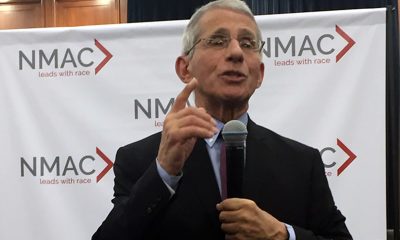News
Nearly 200 lawmakers seek action from Obama for LGBT workers
Dem leaders, zero Republicans, call for executive order
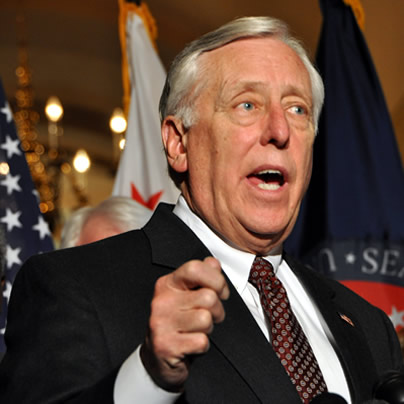
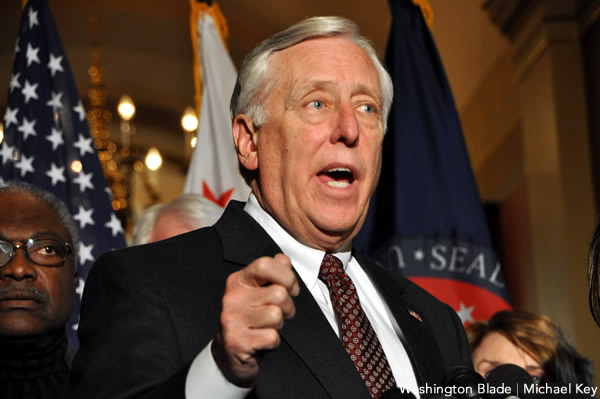
House Minority Whip Steny Hoyer (D-Md.) was the highest-ranking congressman to call for the ENDA executive order. (Washington Blade photo by Michael Key)
As legislation to protect LGBT workers from discrimination continues to languish in the U.S. House, an unprecedented number of nearly 200 lawmakers on Tuesday — including members of House Democratic leadership — called on President Obama to take administrative action.
In a letter dated March 18, 148 House members and 47 senators — making for a total of 195 lawmakers — urged Obama to sign an executive order barring federal contractors from discriminating on the basis of sexual orientation and gender identity as part of his plan for a “Year of Action” in 2014.
“As we continue to work towards final passage of the Employment Non-Discrimination Act (ENDA) with strong bipartisan support, we urge you to take action now to protection millions of workers across the country from the threat of discrimination simply because of who they are or who they love,” the letter says. “We are committed to doing all that we can in Congress to get ENDA to your desk this year; however, there is no reason you cannot immediately act by taking this important step.”
The letter says “time is of an essence” for a signature on the executive order because even when that happens, a process that “will take many months, if not longer” to implement the directive fully will be necessary.
In the House, the letter was circulated by the LGBT Equality Caucus along with Reps. Frank Pallone (D-N.J.) and Lois Capps (D-Calif.), while ENDA’s chief sponsor in the Senate Jeff Merkley (D-Ore.) circulated the letter in that chamber with Sens. Tammy Baldwin (D-Wis.) and Tom Harkin (D-Iowa).
It’s not the first time members of Congress have penned their names to a letter calling on Obama to take administrative action to protect LGBT workers from discrimination. In 2011, Pallone and Capps led an effort to sign a similar letter, which at the time was signed by 72 House members. In 2013, they circulated another letter on the issue signed by 110 House members as Merkley submitted yet another missive signed by 37 senators.
The series of letters from lawmakers over the course of recent years — in addition to regular questioning on the issue for White House Press Secretary Jay Carney — have been to Obama on the executive order as LGBT advocates have pressed for it for some time.
But the latest missive has more lawmakers calling for the executive order than the 2013 letter and, for the first time, has members of Democratic leadership as signatories: House Minority Whip Steny Hoyer (D-Md.) and Assistant Minority Leader Jim Clyburn (D-S.C.). The Blade first reported Hoyer would sign the letter on Monday.
Although House Minority Leader Nancy Pelosi has publicly said she supports the executive order as far back as 2011 she didn’t sign the letter. Drew Hammill, a Pelosi spokesperson, said his boss rarely signs group letters and would raise the issue in a private missive to Obama.
Also missing from the letter is Senate Majority Leader Harry Reid (D-Nev.), who also gave his green light for the potential directive in January. Reid’s office indicated that he doesn’t typically sign member letters.
Rep. Debbie Wasserman Schultz (D-Fla.), chair of the Democratic National Committee, also didn’t pen her name to the letter. Last week, sources told the Blade she had discouraged members from signing previous iterations of the letter, but her office called that assertion a “bald-faced lie.” She hasn’t articulated support for the executive order.
Not a single Republican signed the letter. Not one of the 10 Republicans who voted for the Employment Non-Discrimination Act in the Senate late last year or any of the six GOP co-sponsors of ENDA in the House penned their name to the missive.
Tico Almeida, president of Freedom to Work, said his organization helped to secure signatures for the letter — and hopes it’ll be the last time the effort is necessary.
“This week, we collaborated with the Equality Caucus for the third time to collect signatures on the 2014 letter to President Obama on the same topic,” Almeida said. “These year-after-year delays from the White House are making this all start to feel like Bill Murray’s ‘Groundhog Day,’ and I really hope we don’t have to push for yet another congressional letter to President Obama in 2015 or 2016 or a letter to President Hillary Clinton in 2017. It’s long past time for President Obama to keep his word and create LGBT workplace protections at the companies that profit from taxpayer-funded contracts.”
The White House has responded to other letters like this one in the past by saying it has no updates to provide on a “hypothetical” executive order protecting LGBT workers. It didn’t respond to comment on the latest letter.
Last week, Carney reiterated Obama’s support for the Employment Non-Discrimination Act when asked about the executive order.
“Our view is that Congress ought to pass the Employment Non-Discrimination Act,” Carney said. “I don’t have any updates for you on possible executive orders. What we’re focused on is on a legislative remedy that would be more comprehensive and that has already seen progress in Congress. So I don’t have a view to express on that particular issue.”
Lawmakers who organized the signature-gathering for the letter in both the House and Senate issued their own words on the importance of Obama signing the executive order.
Merkley said signing the executive order would help ensure LGBT people have access to equal opportunity in the workplace.
“All Americans deserve fairness in the workplace,” Merkley said. “There is no reason to wait any longer to extend non-discrimination policies to federal contractors and protect millions of Americans from being fired for who they are or who they love.”
Capps said in a statement she hopes Obama “will immediately sign an executive order” to protect LGBT workers against discrimination.
“This issue has lingered for far too long and this year, in the president’s year of action, he should take this opportunity to expand employment protections,” Capps said. “Doing so would be a significant and meaningful advancement for LGBT Americans—legally, politically, and culturally. With workers across the country facing discrimination every day, the time is now to make sure workplace discrimination isn’t supported by taxpayer funds.”
As Capps observes, the Williams Institute published a report finding that the executive would extend non-discrimination protections to the estimated 16.5 million employees at federal contractors. (The number of people within this population who are LGBT is estimated to be smaller and between 400,000 and 600,000 people.)
Capps added that she been pushing Obama to sign the executive order for years and “will not stop pushing this issue — it is time for the president to act.”
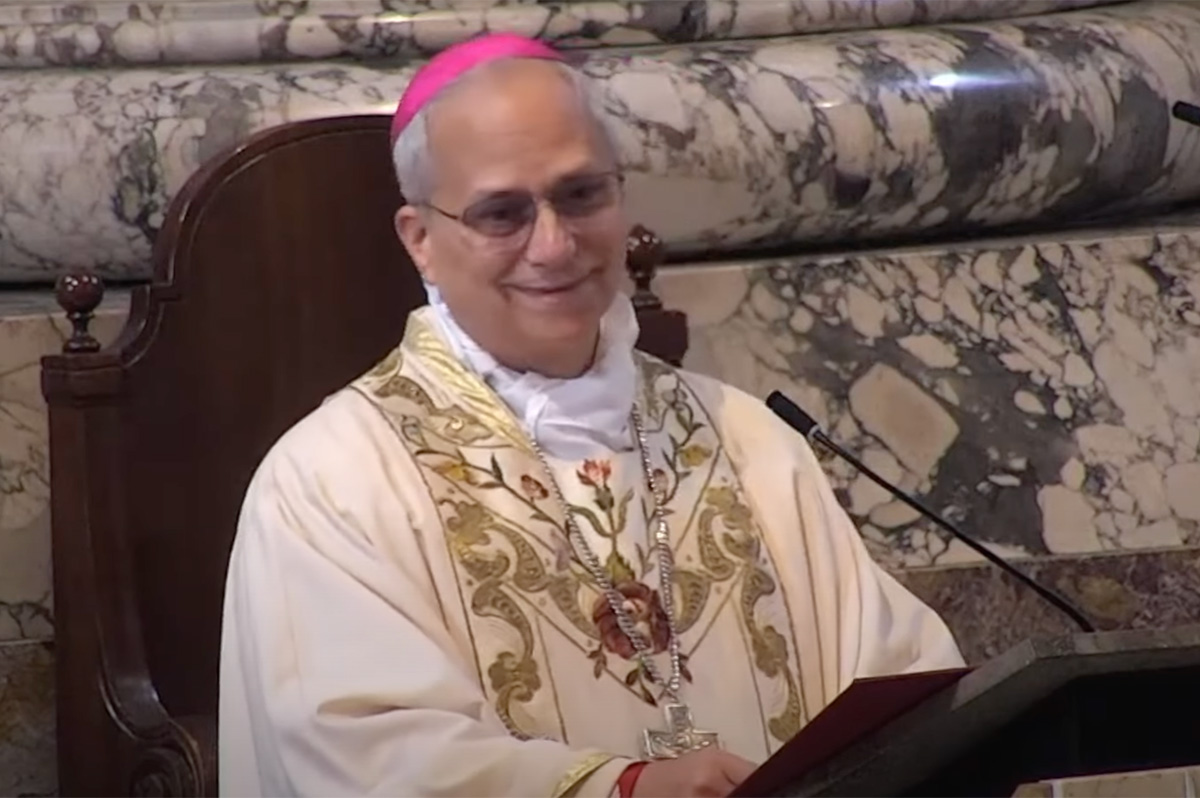
The College of Cardinals on Thursday elected Cardinal Robert Prevost from Chicago as the Catholic Church’s next pope.
Leo XIV’s election took place less than three weeks after Pope Francis died at Casa Santa Marta, his official residence at the Vatican. The conclave to choose his successor began on Wednesday.
Leo XIV, who was born in Chicago in 1955, is the first American pope.
Leo XIV was bishop of the Diocese of Chiclayo in Peru from 2015-2023. Francis made him a cardinal in 2023
“We salute the appointment of the new Pope Leo XVI,” said the U.S. Embassy in Peru on X.
“A celebration for the world’s Catholics, and a joy especially shared between the American people and the Peruvian people. From Chicago to Chiclayo.”
U.S. Rep. Robert Garcia (D-Calif.), a gay man of Peruvian descent, also congratulated Leo XIV.
“As a Catholic and Peruvian American, I wish Pope Leo XIV strength as he steps into his role as a global and spiritual leader,” said the California Democrat on X. “He has demonstrated that he believes in justice for the poor and immigrants. May his leadership reflect these ideals as he spreads peace across the world.”
As a Catholic and Peruvian American, I wish Pope Leo XIV strength as he steps into his role as a global and spiritual leader. He has demonstrated that he believes in justice for the poor and immigrants. May his leadership reflect these ideals as he spreads peace across the world.
— Congressman Robert Garcia (@RepRobertGarcia) May 8, 2025
Francis died on April 21 at Casa Santa Marta, his official residence at the Vatican. The conclave to choose the Argentine pontiff’s successor began on Wednesday.
The Vatican’s tone on LGBTQ and intersex issues softened under Francis’s papacy, even though church teachings on homosexuality did not change.
Francis, among other things, described laws that criminalize consensual same-sex sexual relations as “unjust” and supported civil unions for gays and lesbians. Transgender people were among those who greeted Francis’s coffin at Rome’s St. Mary Major Basilica before his burial on April 26.
The New York Times reported Leo XIV in a 2012 speech to bishops specifically cited “homosexual lifestyle” and “alternative families comprised of same-sex partners and their adopted children” when he said Western media and popular culture has promoted “sympathy for beliefs and practices that are at odds with the gospel”
Marianne Duddy-Burke, executive director of DignityUSA, a group that represents LGBTQ Catholics, traveled to Rome for the conclave.
She told the Washington Blade in a text message from St. Peter’s Square shortly after Leo XIV’s election that she “heard him speak” last October and “found him thoughtful and gently challenging.”
“[He] hasn’t said a lot since early 2010s. [I] hope he has evolved,” said Duddy-Burke. “His commitment to synodality is a hopeful sign.”
Her group later issued a statement.
“This election appears to signal a willingness to continue building on Pope Francis’s commitment to synodality and social justice,” said DignityUSA. “We pray that the needs of those whom our church has historically marginalized, including LGBTQ+ people and their families, will continue to be heard and addressed by the Vatican and other church leaders.”
Francis DeBernardo, executive director of New Ways Ministry, a Maryland-based LGBTQ Catholic organization, in a statement said there is “a special pride in having the first pope from the United States, his longtime ministry in Latin America most likely had an equally formative influence on his spirituality and approach to church issues.” DeBernardo, however, criticized Leo XIV’s 2012 comments.
“We pray that in the 13 years that have passed, 12 of which were under the papacy of Pope Francis, that his heart and mind have developed more progressively on LGBTQ+ issues, and we will take a wait-and-see attitude to see if that has happened,” he said.
“We pray that as our church transitions from 12 years of an historic papacy, Pope Leo XIV will continue the welcome and outreach to LGBTQ+ people which Pope Francis inaugurated,” added DeBernardo. “The healing that began with ‘Who am I to judge?’ needs to continue and grow to ‘Who am I, if not a friend to LGBTQ+ people?'”
DignityUSA agreed.
“We express concern with the former Cardinal’s statements — as reported in the New York Times — in a 2012 address to bishops, where he stated that Western news media and popular culture fostered ‘sympathy for beliefs and practices that are at odds with the gospel’ including the ‘homosexual lifestyle’ and ‘alternative families comprised of same-sex partners and their adopted children.'” We note that this statement was made during the papacy of Benedict XVI, when doctrinal adherence appeared to be expected,” said the organization in its statement. “In addition, the voices of LGBTQ people were rarely heard at that level of church leadership. We pray that Pope Leo XIV will demonstrate a willingness to listen and grow as he begins his new role as the leader of the global church.”
Vanuatu
Vanuatu lawmakers consider constitutional amendment to recognize two genders
Country decriminalized consensual same-sex sexual relations in 2007

Lawmakers in Vanuatu are considering an amendment to the country’s constitution that would recognize only two sexes: Male and female.
The Vanuatu Daily Post in an April 23 article quoted Vanuatu Christian Council Chair Collin Keleb, a pastor with the Presbyterian Church of Vanuatu, said the country “cannot allow someone from outside to influence or empower them (the LGBTQ community), which will cause them to go astray instead of maintaining and uniting ourselves as children of God.”
The country’s Council of Ministers has approved the proposed amendment. The Vanuatu Daily Post notes the government has said the measure would “align the country’s laws with the preambles of ‘Melanesian values and Christian principles’ upon which Vanuatu was founded.”
Vanuatu is an island country in the South Pacific that is located roughly 1,100 miles northeast of Australia’s Queensland state.
Consensual same-sex sexual relations have been decriminalized in Vanuatu since 2007.
It remains unclear when the proposed amendment will receive final approval.
Virginia
Va. officials investigate Loudoun County schools over trans student in locker room
Boys’ complaints prompted LCPS to investigate them for Title IX violations

Governor Glenn Youngkin and Attorney General Jason Miyares on Tuesday announced they have launched an investigation into how Loudoun County Public Schools has handled the case of three male high school students who complained about a transgender student in a boys’ locker room.
One of the boys’ fathers told WJLA that Loudoun County public schools launched an investigation into whether his son and the two other boys sexually harassed the student after they said they felt uncomfortable with their classmate in the locker room at Stone Bridge High School in Ashburn.
“He was questioning why there was a female in the males’ locker room,” the father told WJLA. “And other boys were uncomfortable [with a female in the boys’ locker room].”
“There were other boys asking the same question,” he added. “They [LCPS] created a very uncomfortable situation. They’re young, they’re 15 years old. They’re expressing their opinions, and now they’re being targeted for expressing those opinions.”
WJLA notes Loudoun County public schools allows students to use bathrooms and locker rooms based on their gender identity. The father who spoke with WJLA said Loudoun County public schools should reverse the policy and dismiss the Title IX complaint it has brought against his son and the two other boys.
The Richmond-based Founding Freedoms Law Center is representing the boys and their families.
“It’s deeply concerning to read reports of yet another incident in Loudoun County schools where members of the opposite sex are violating the privacy of students in locker rooms,” said Youngkin in a statement that announced the investigation. “Even more alarming, the victims of this violation are the ones being investigated — this is beyond belief. I’ve asked Attorney General Miyares to investigate this situation immediately so that every student’s privacy, dignity, and safety are upheld.”
“Students who express legitimate concerns about sharing locker rooms with individuals of the opposite biological sex should not be subjected to harassment or discrimination claims,” added the Republican.
The Virginia Department of Education in 2023 announced the new guidelines for trans and nonbinary students for which Youngkin asked. Equality Virginia and other advocacy groups claim they, among other things, forcibly out trans and nonbinary students.
The U.S. Department of Education’s Office of Civil Rights in February launched an investigation into whether Loudoun County and four other Northern Virginia school districts’ policies in support of trans and nonbinary students violate Title IX and President Donald Trump’s executive order that prohibits federally funded educational institutions from promoting “gender ideology.”
-
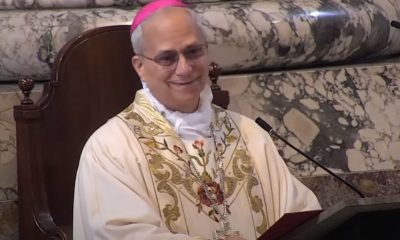
 The Vatican19 hours ago
The Vatican19 hours agoAmerican cardinal chosen as next pope
-

 a&e features1 day ago
a&e features1 day agoYour guide to the many Pride celebrations in D.C. region
-

 U.S. Supreme Court3 days ago
U.S. Supreme Court3 days agoSupreme Court allows Trump admin to enforce trans military ban
-

 District of Columbia2 days ago
District of Columbia2 days agoWorldPride permits for National Mall have yet to be approved

